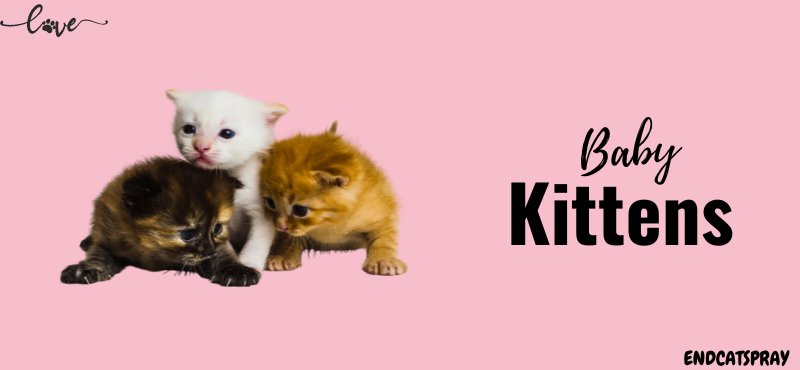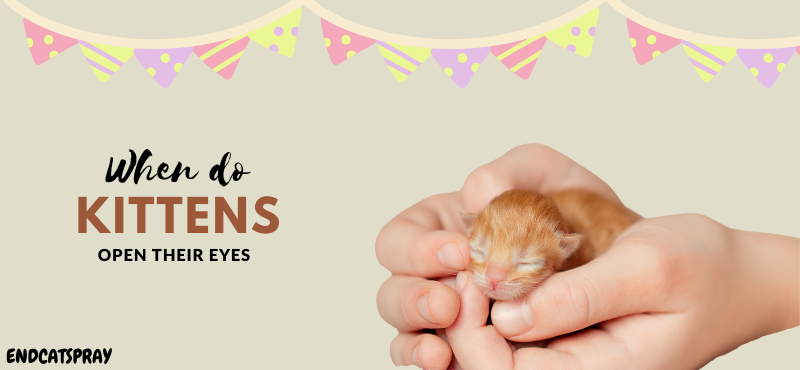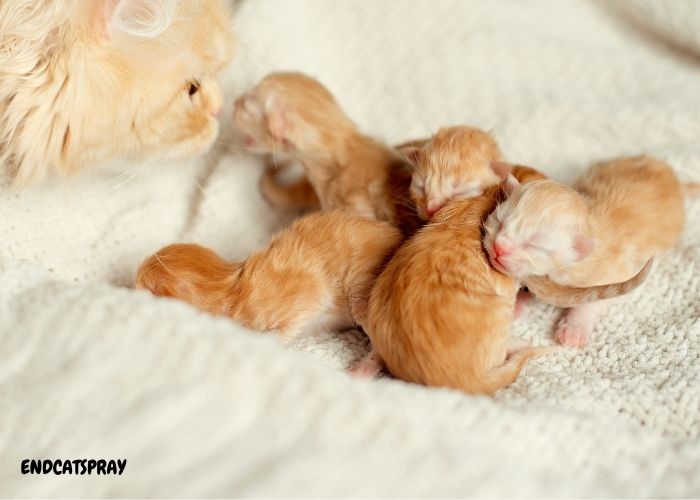Kittens typically begin to open their eyelids between 2 to 16 days after their birth. Some of them take up to 2 weeks, but their vision is blurry, and they improve it a few weeks after birth.
- Kittens typically begin to open their eyelids between 2 to 16 days after their birth.
- After One to two weeks, the kitten starts seeing everything cloudy, and it takes a few more weeks for them to adjust to their surroundings
- The eye color is typically blue in the first few weeks because they lack the iris pigment. Baby cats develop permanent eye color at around four weeks to 6 weeks old.
Newborn kittens are very sensitive in their initial weeks after birth, and there are a lot of challenges when it comes to taking good care of the newborn cats in your home.
Without proper knowledge and experience, we might make a mistake that can be a hurdle to the proper growth and development of the kittens.
We will not only answer the most commonly asked questions about kittens but also give you new ideas on how to take care of your newborn baby kitten safely at home.
When do Kittens Start to See?
After One to two weeks, the kitten starts seeing everything cloudy, and it takes a few more weeks for them to adjust to their surroundings; it starts sharpening their eyesight, and they begin to see properly.
How to Properly Take Care for the Eyes of your Newborn Kitten:

It takes a lot of care and attention to properly care for the newborn feline during the first few weeks.
1. We must try to minimize the direct handling of newborn cat’s eyes as they are delicate and very sensitive. We must avoid touching and forcing them to open their eyelids or make them fully open with our fingers.
2. Make sure the place where the queen and the babies are staying is clean, and change the bedding frequently to make the place free from dust and debris that might irritate the eyes of the newborns of your queen.
3. Monitor for any signs of an eye discharge, such as pus in green or yellow color, which could indicate an eye infection; consult a veterinary doctor for guidance in such cases. You always notice that their eyes must be clean.
4. Gently cleanse the eyes of the newborn kitten with a warm, wet cloth if the eyes feel a bit crusty and slightly stuck shut.
5. Ensure that in the process of caring for a newborn kitten, we avoid exposure to too much light as it can harm the feline’s vision and cause various issues in its growth and development.
When you should be Concerned about your Newborn Kitten’s Eyes:
- You should be worried about your newborn feline’s eyes for any kind of infection like Pink Eye (conjunctivitis), redness, swelling, and excessive tearing. Also, consult a vet if such symptoms appear.
- If your kitten is not opening its eyes after 14 days or struggling to open its eyes after two weeks, you should be worried and consult an animal specialist.
- Sometimes, we don’t notice the kitten rubbing its eyes too often and struggling to focus; that could be a hidden health issue. We must watch our newborn cats to ensure that if such symptoms appear, we take our cats to the doctor for a proper cure.
When Do Kittens’ Eyes Change Color?
The eye color is typically blue in the first few weeks because they lack the iris pigment. Baby cats develop permanent eye color at around four weeks to 6 weeks old.
The blue color will eventually fade, and by three months, their eyes will fully transition into the final color, which stays throughout their lives.
Common Eye Problems in Kittens:
In the early stages of development, kittens can experience many eye problems. Here is the list of the ten most common eye problems in kittens
1. Conjunctivitis (Pink Eye)
2. Eye Infections (Redness / Discharge)
3. Corneal Ulcers
4. Entropion (Eyelid Rolled Inward)
5. Third Eyelid Protrusion
6. Feline Herpes virus (FHV-1)
7. Blocked Tear Ducts
8. Cataracts
9. Uveitis
10. Foreign Bodies (Small debris or dust going into the eye and causing problems)
Overall Kitten Care and Ideas:

Caring for newborn Kittens is very easy when the mother cat is around. We can start holding kittens after a week or two when they start moving a little bit and when their lids open naturally.
We should still try not to stress the mother and kittens by frequently holding them. instead, we should keep the baby cats warm and give them a clean place and bedding to thrive, as it is crucial to keep newborns warm.
Newborn kittens spend more than 22 hours of sleep and adult cat can also sleeps for 12 to 20 hours straight so we must avoid disturbing kittens and adult cats while they sleep.
Newborn cats need essential nutrients, which they primarily get from their mother’s milk. Still, if the mother is unavailable, cat milk replacers are also available in the market, providing all the essential proteins and nutrients needed for proper growth.
Immunizations are started after 1.5 months to 2 months after the birth of the kitten so vaccination in routine is important for better health results. With better places and good nutrition, we must observe the kittens for infections and diseases and keep in touch with the veterinary doctors.
One week old kittens:
As we all know, kittens are born with their eyes closed. In some cases, newborn kittens open their eyes at the end of the first week.
By the first week, young kittens depend entirely on their mother’s milk for nutrition. Newborn kittens without a mother should be bottle fed a special kitten formula every 2-4 hours.
Average weight of one week old kittens is between 150 – 250 grams. You should provide the kitten with a heating source to keep them warm.
Two weeks old kitten:
When a kitchen reaches 2 weeks of age, you can expect them to open their eyes. But the vision is still under development.
Young kittens for two weeks can’t walk or poop on their own, so their mothers will keep on stimulating their genital areas to help them poop. By the end of 2nd week, they start to hear, which keeps improving in the following weeks.
Three week’s kittens:
If you’re wondering when kittens start getting their teeth, it’s at about 3 weeks old. The first teeth will begin to appear at the front of their mouth.
Three weeks old kittens also have ears that point upwards. Meanwhile, their hearing keeps improving, and they begin trying to walk, but they don’t shift to solid food for three weeks.
Around three weeks, the kittens start to show and control their body movements and also start pooping on their own.
Four week’s kittens:
By four weeks of age, they start eating soft and moist solid food. Their hearing keeps developing, and many kittens can focus on far off sounds. They even start using the litterbox if it is introduced. Their walking improves, and they become more alert.
Five weeks old kittens:
By 5 weeks of age, their ears improves and they start to focus with both eyes. They can walk, jump, and run and keep up the transition towards solid food. They become more active and playful.
Six weeks old kittens:
In 6th week, their vision becomes more precise, and their eye color starts changing from blue eyes. They start feeding on solids more than milk and become more independent towards 6 to 8 weeks old.
Seven weeks old kittens:
In the seventh week, the permanent eye color is much more noticeable, and kittens start depending fully on solid feed. If they are introduced to a litterbox, they will be fully trained to use that litterbox.
8 weeks old kittens:
In the eighth week, they can feed on solid food without any assistance or help. They can poop on their own in a litterbox and can be more curious about their surroundings. At this age, they can be adopted into new homes.
Will a Mother Cat Reject her Kittens if You Touch them?
No, A mother cat will not reject her kittens if you or any human touches them or hold them for a while. We should only be careful not to harm the kittens as it can make their mother aggressive or stressed.
Common Mistakes to Avoid with Kittens:
Here are some of the common mistakes to avoid when caring for the baby Feline friends.
1. We must not touch the newborn kittens in the early stages as it can stress the cat and their babies.
2. We must not give Cow milk or adult cat food as they need specialized kitten formula and high-quality food as they grow up.
3. Newborn Kittens can’t regulate their body heat, so for the first two months, you need to make sure they have a warm place to grow. When kittens get too cold, they can die if not taken care of.
4. We must avoid overfeeding and underfeeding the kittens and must consult the vet for proper guidance to feed our kitten if the mother is not around.
5. We must start litter training around 4th week of their birth, as late training can make the process harder. Continue to provide your kitten easy access to the litterbox.
6. We must supervise our kittens and make sure to visit the vet more often for proper medical checkups and vaccinations. Many kittens can’t survive due to a lack of first appointment for vaccination.
7. We must not force a kitten’s eyes open at any cost as the eyes may get infected badly. They are sensitive and strong light might harm their developing eyes forever. Therefore, it is essential to keep kittens away from bright lights till their vision fully develops.
Conclusion of When do Kittens Open their Eyes? Vet-Verified Facts & FAQ:
Newborn Feline friends have unique needs in their early weeks, and Caring for them requires attention and understanding. We should be able to understand their minor signals, such as crying when they are hungry or uncomfortable. We explained how to feed your kitten properly.
Each physical detail matters when it comes to ensuring healthy development and proper growth. The above guide has explained the answers to many challenges and how to tackle such challenges in caring for a newly arrived kitten.
We must know how to manage all the issues while respecting the mother cat’s comfort.
FAQS:
Will newborn kittens cry when hungry?
Yes, Newborn feline babies will cry when they are hungry or need any attention. This is one of the ways they communicate with their mother and caregivers.
Can I touch a 2-week-old kitten?
Yes, you can touch a 2-week-old kitten, but it is essential to be gentle and hold them when necessary.
References:
https://www.quora.com/At-what-age-do-kittens-open-their-eyes-start-hearing-and-eating-solid-food










